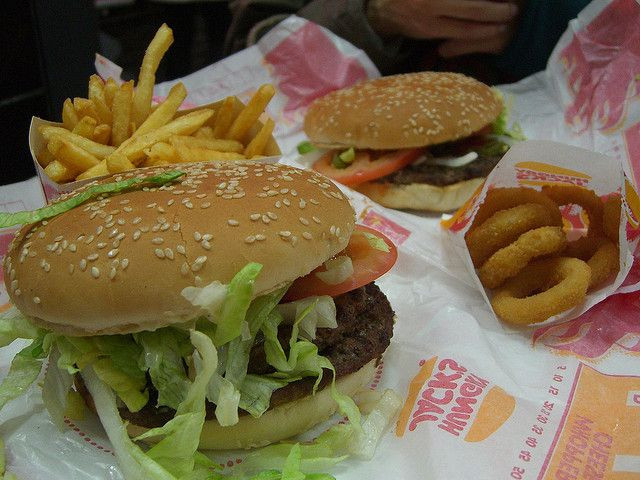Metabolic Syndrome Symptom Triggers Could Be As Small As A Single Piece Of Junk Food

We’ve all been there. Stomachs growling, hours away from our next real meal. Resisting temptation is hard, so we reach for a snack — maybe a bag of chips or the brownies someone brought into the office — and devour it. While at the time you may not have thought about it, doing this constantly could set yourself up for metabolic disease.
These were the results of a new study published in The FASEB Journal, which found people who overeat during snacktime — or mealtime, for that matter — trigger a chain reaction that can lead to metabolic disease. The Mayo Clinic defines metabolic disease, also known as metabolic syndrome, as a cluster of conditions that occur together and increase risk of heart disease, stroke, and diabetes. These conditions include increased blood pressure, a high blood sugar level, excess body fat around the waist, and abnormal cholesterol levels.
Dr. Susan Wopereis, an author of the study from TNO, Microbiology, and Systems Biology Group in The Netherlands, and her team of researchers found some study participants with metabolic syndrome, who ingested a single, high-fat milkshake, instantly made their condition worse. Meanwhile, other participants without metabolic syndrome, who overate for only short periods of time, were able to trigger reactions in the body that signaled the beginning of the disease.
The small study involved two groups of adult volunteers; one group comprised 10 healthy males, while the other consisted of nine men who suffered from metabolic syndrome and had two or more of the aforementioned risk factors for heart disease. Both groups submitted blood samples before and after drinking a high-fat milkshake. In these samples, the researchers measured 61 biomarkers — like high cholesterol and blood sugar — and found signs of abnormal biochemical processes related to sugar and fat metabolism in the men with metabolic syndrome. These men also experienced inflammation.
On top of the milkshake, the healthy participants were given a hypercaloric diet of sweet and savory snacks, like candy bars, tarts, peanuts and chips, each day for four weeks — totaling an additional 1,300 calories per day. Researchers then evaluated the same 61 biomarkers in the healthy volunteers at the end of the four weeks and found hormones that control sugar and fat metabolism as well as inflammation had changed to resemble the very beginning of the negative health effects found in those with metabolic disease.
"Eating junk food is one of those situations where our brains say 'yes' and our bodies say 'no,'" said Dr. Gerald Weissmann, editor-in-chief of The FASEB Journal, in a press release. "Unfortunately for us, this report shows that we need to use our brains and listen to our bodies. Even one unhealthy snack has negative consequences that extend far beyond any pleasure it brings."
Source: Wopereis S, et al. Quantifying phenotypic flexibility as the response to a high-fat challenge test in different states of metabolic health. The FASEB Journal. 2015.



























